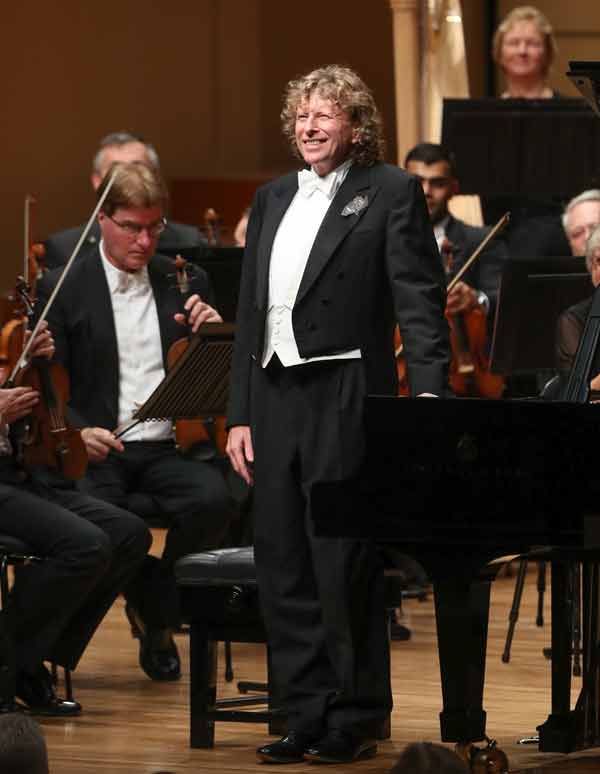Tchaikovsky’s 'Francesca da Rimini' sets Dante’s reworking of the true-life doomed romance of Francesca and her husband’s brother to the form of a symphonic poem.
Beloved of the romantic movement, the story is the basis of at least 25 operas, multiple musical pieces in various forms, and numerous works of art including Rodin’s 'The Kiss' (originally entitled 'Francesca da Rimini')!
Tchaikovsky’s triumphant one-movement work draws us into the maelstrom of the second circle of hell, with ominous shrieking strings and heart-stopping musical drama evoking the eternal whirlwinds that sweep the murdered lustful adulterers through the air, an endless torture for allowing their passions to sweep them away on earth!
Click here for social pictures.
We have in the past described conductors seemingly drawing the music forth from their musicians—not so Enrique Arturo Diemecke, who looks for all the world as if he is pushing the music and energy into the orchestra! Standing alone on the podium with no music stand or baton to impede his delivery, he cut and thrust with broad, impassioned and emphatic gestures, and even leapt into the air on many occasions, commanding our rapt attention. And the orchestra responded willingly with fervour, countered by lighter winds and harp, and sombre reeds and then a veritable forest of blurred bows and bold brass drawing us towards the cymbal-crashing crescendo of the finale!
 In Simon Perry’s pre-concert talk, Moszkowski’s piano concerto was deemed (and not just by Perry) to be on a par with Rachmaninov’s efforts in the genre. Certainly there are moments of significant power, particularly in the first movement where the orchestra takes a decided back seat to the piano, being largely reduced to an accompanying role—there are also some beautiful lyrical melodies, and the second movement stands out in particular in this regard. Although we consider the comparison with Rachmaninov to be generous to Moszkowski’s work, we definitely agree that this piano concerto should be more widely heard.
In Simon Perry’s pre-concert talk, Moszkowski’s piano concerto was deemed (and not just by Perry) to be on a par with Rachmaninov’s efforts in the genre. Certainly there are moments of significant power, particularly in the first movement where the orchestra takes a decided back seat to the piano, being largely reduced to an accompanying role—there are also some beautiful lyrical melodies, and the second movement stands out in particular in this regard. Although we consider the comparison with Rachmaninov to be generous to Moszkowski’s work, we definitely agree that this piano concerto should be more widely heard.This concert was in part a celebration of a 40-year association between the pianist and the orchestra, itself celebrating a 70th anniversary this year. Although born and currently based in London, Piers Lane grew up in Brisbane and was clearly delighted to be playing here again and on such an auspicious convergence. With trademark colourful socks very much in evidence, Lane powered through the many complexities of Moszkowski’s work and showed us why many believe that this is an underutilised part of the repertoire. Returning for an encore, encouraged by a prolonged standing ovation, he stayed with Moszkowski to give us the delightful 'Étincelles' ('Sparks').
Click here for social pictures.
After the interval we returned for Dvorak’s Symphony No. 7. According to some critics the purest example of the symphonic form since Beethoven, this is a grandiloquent masterpiece of a work. It was almost too much! Grand passions, wild emotions, furious bowing and the very biggest of sounds from seemingly all parts of the orchestra, and with Diemecke once again literally jumping up and down on the podium energising the musicians, this may have been a tour de force too far. But in the end, it was magnificent and we too were swept up in the emotion and carried over the line by the energy on stage, and a performance which left everyone, conductor, performers and audience alike, smiling the very broadest of smiles. Congratulations to the QSO on a flawless performance!
Peter Ilyich Tchaikovsky – 'Francesca da Rimini' – Fantasia after Dante, Op.32
Moritz Modzkowski – Piano Concerto in E major, Op.59
Antonin Dvořák – Symphony No.7 in D minor, Op.70

